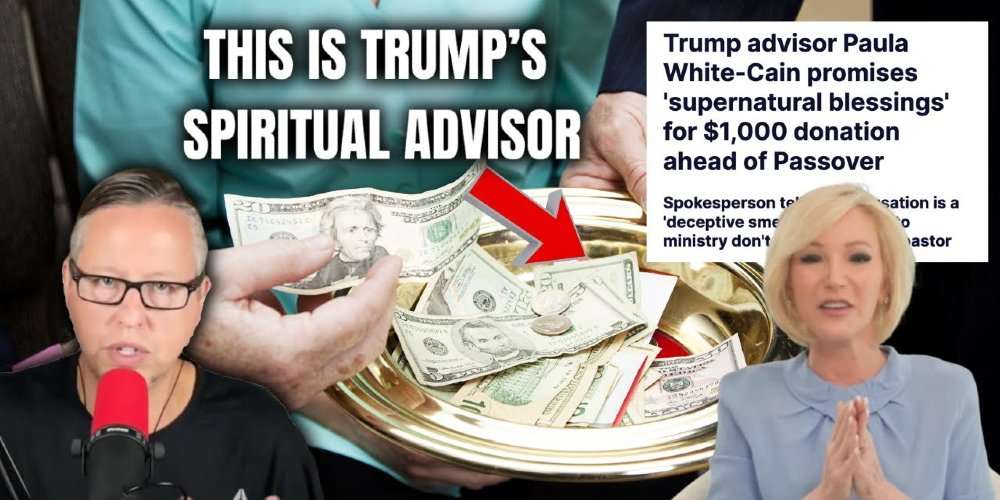In tonight’s podcast, we discuss the recent controversial statement that Donald Trump’s spiritual advisor and the woman leading his White House Faith team has made. In this episode, we examine how Paula White has not changed but is still very vocal with her false doctrine despite efforts to play “damage control” after her recent video.
Video summary generated by AI.
Is Paula White’s Prosperity Gospel Still Influencing the White House?
Paula White, a name synonymous with controversy and, for many, the prosperity gospel, continues to be a figure of interest as Donald Trump’s spiritual advisor. For years, she’s faced criticism, but the spotlight shines brighter now given her position close to the former president. Is her teaching just harmless encouragement, or is it something more concerning? Let’s take a look at a recent headline-grabbing statement and what the Bible says about such teachings.
The Controversy Surrounding Paula White’s Teachings
Recently, White made headlines with a promise that sounds too good to be true: “Trump advisor Paula White-Cain promises ‘supernatural blessings’ for $1,000 donation ahead of Passover.” What exactly does that mean?
Basically, White claimed that donating $1,000 to her ministry before Passover would unlock “seven supernatural blessings.” These aren’t small things, either. She said, referencing Exodus 23, that these blessings would include:
- God will assign an angel to you.
- He’ll be an enemy to your enemies.
- He’ll give you prosperity.
- He’ll take sickness away from you.
- He will give you long life.
- He’ll bring increase and inheritance.
- He’ll give a special year of blessing.
That’s a pretty powerful package!
Now, she did add a disclaimer: “You’re not doing this to get something, but you’re doing it in honor to God.” But it’s hard to ignore the implied connection between the donation and the blessings.
And it doesn’t stop there. For those who give $125, donors get an olive wood communion set. People who donate $1,000 or more, they are promised a Waterford crystal cross. The whole thing ends with an urgent plea: “Don’t miss your moment to release seven supernatural blessings of provision into your life!” Does this sound like a sales pitch, or a genuine spiritual opportunity?
Biblical Warnings Against False Teachers
So, is this kind of teaching biblical? The Bible actually has a lot to say about false teachers and those who use faith for financial gain. Let’s look at some key scriptures:
- 2 Timothy 3:1-5: This passage warns about “perilous times” in the last days, with people being “lovers of themselves, lovers of money, boasters, proud…” It’s a pretty sobering list. Prioritizing money over genuine faith definitely fits the bill here, doesn’t it?
- Matthew 7:15-16: Jesus warns us to “Beware of false prophets, who come to you in sheep’s clothing but inwardly are ravenous wolves.” How can you spot them? “You will know them by their fruits.”
- 1 Timothy 6:3-5: This scripture is direct: “If anyone teaches otherwise and does not consent to wholesome words… and to the doctrine which accords with godliness, he is proud, knowing nothing…” It goes on to say that some people think “godliness is a means of gain.” Some translations make it even clearer: they use godliness to get rich.
- 1 Timothy 6:10: Here’s a verse we’ve all heard: “For the love of money is a root of all kinds of evil.” It’s important to remember that money itself isn’t evil. Money in the right hands can do a lot of good. But loving money, putting it above everything else, that’s where the trouble starts.
- Matthew 24: Jesus himself warned about deception in the last days. He said that false prophets would rise and lead many astray. He also said that “because lawlessness will increase, the love of many will grow cold.” False teaching can lead to spiritual decline, causing people to lose their faith altogether.
- 2 Peter 2:1-3: This passage talks about false teachers who will “secretly introduce destructive heresies” and “exploit you with fabricated stories.” The word “exploit” is key here. The original Greek implies a business transaction, treating followers like customers to be profited from.
Think about that for a minute. Are some ministries treating you like a customer, offering special perks and access based on how much you donate? Is it about genuine partnership, or is it more like a tiered rewards program? Are you a follower, or just a customer?
Addressing Paula White’s Theology and Influence
Is Paula White teaching the prosperity gospel? For many, the answer is a clear yes. The prosperity gospel is the idea that God wants you to be rich and healthy, and that financial giving is a way to unlock those blessings. It’s easy to see how White’s teachings fit into that framework.
While the blessings she mentions are available to believers, putting a price tag on them is wrong. Salvation and a relationship with God aren’t things you can buy. They’re gifts freely given.
And then there’s the question of her role as a spiritual advisor. Should someone with these kinds of teachings be advising a world leader? It raises concerns about influence and judgment. Remember the video of her and her husband discussing how to “spice up” their sex life in front of a church congregation?
When the criticism started rolling in, a spokesperson for Paula White Ministries called the story “a deceptive smear.” They pointed out that White specifically said, “You’re not doing this to get something.” They also claimed that donations don’t directly benefit White and that she doesn’t get paid for her White House role.
But even if she’s not personally profiting, the message is still problematic. It creates a sense of obligation and manipulates people’s desire for God’s blessing.
It’s also not the first time she has made headlines. Back in 2016, she offered an Easter Sunday “resurrection seed” for $1,144. And let’s not even get started on the whole “deliverance ministry” trend. Too many people are focused on casting out demons when they really need to focus on self-discipline and living a holy life.
Someone once said, “The reality is far more Christians need self-discipline, fasting, and putting to death the deeds of the flesh more than they need to have a demon cast out of them.” The Apostle Paul talked a lot about spiritual warfare, but his emphasis was on crucifying the flesh and walking in the Spirit, not constantly battling demons.
In a 2016 interview with the Christian Post, White claimed she doesn’t believe in the prosperity gospel. She said, “I do believe that all good things come from God, and I also believe that God teaches us much through our suffering.”
The Broader Implications and Questions
Paula White has been Donald Trump’s spiritual advisor for over two decades. This raises some serious questions. Where were the other advisors when some bizarre things happened like that goat covered in $100 bills? What does her influence mean for the decisions being made?
Those who claim to follow Christ should be held to a higher standard. So, what does all this mean? It means we need to be discerning. We need to examine the teachings and actions of those who claim to be spiritual leaders.
What do you think? Is Paula White a teacher of the prosperity gospel? What are your thoughts on her role as spiritual advisor?
A Call to Discernment
Ultimately, it’s up to each of us to examine the scriptures and make our own decisions about what we believe. But it’s important to be aware of the dangers of false teaching and to be on guard against those who would exploit our faith for their own gain.



